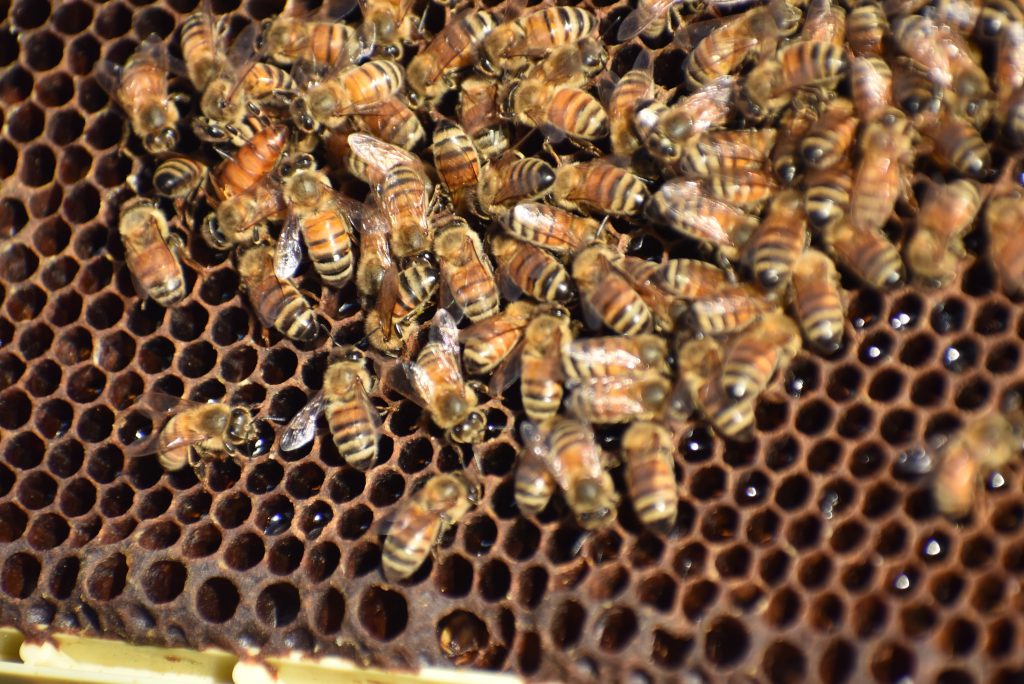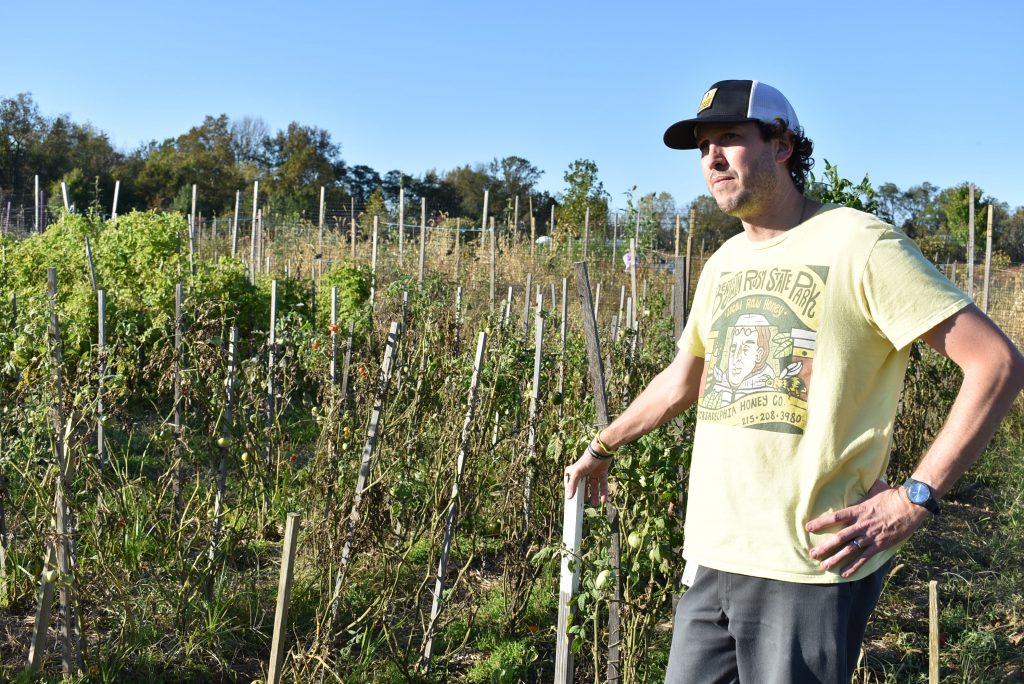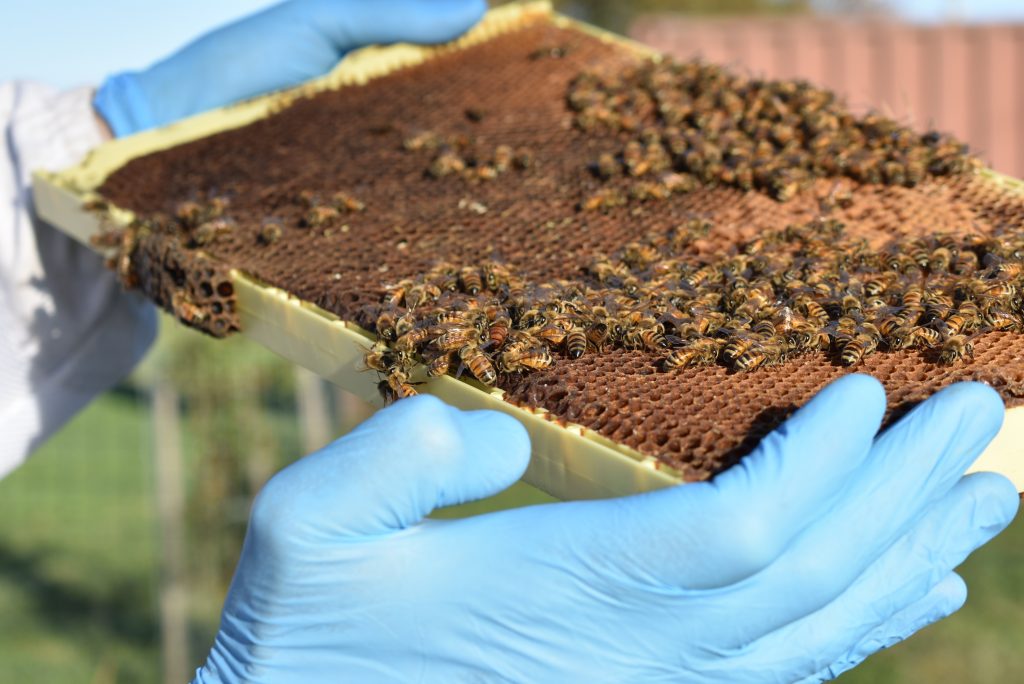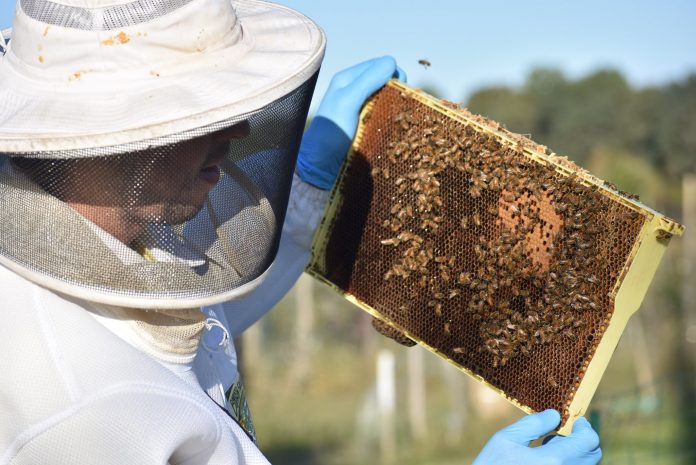The sharp pain of a bee sting is just another part of his daily routine for Denis Cockerham. Donned in a protective beekeeping outfit and blue rubber gloves, Cockerham enters the fenced area where he keeps his nests near the community gardens in Benjamin Rush State Park. He lifts a tray from one of the nests to reveal hundreds of bees that continue their work in the honeycomb tray, unperturbed by his presence.
“The first year I was stung seven times and I said oh, it’s not that bad, and then next year it was like 200,” the Millbrook resident said. “But I was doing more stuff with the bees so you’re going to get stung more.”
But the stings are worth it so Cockerham can do what he loves. He started Bucksadelphia Honey Company, selling local raw honey and spreading knowledge about bees. He visits schools where his three children attend and speaks to the students and is also involved with Boys and Girls Scouts.
Since he set up the apiary three years ago, he has become the father of at least several hundred thousand bees, but probably more. About 20,000 bees live in each of the three nests, with another larger one housing an estimated 60,000 and a smaller housing about 1,000.

That’s a lot of bees – they can be found exploring crops in the community garden, trees and other flora within the only state park in the city, but they can also help pollinate up to 10 miles away from their beehive.
“They’re really very important,” said Beth Bowman, who works with the Pennsylvania Horticultural Society to help run the community garden.
The bees are vital to the garden in a time when bees are becoming rarer and rarer. Bee colony death continues to rise, and according to a survey by Bee Informed Partnership, beekeepers lost almost 40 percent of their honeybee colonies nationwide last winter. Pesticides can kill bees or severely weaken their immune systems, which is why the state park bans use of them – Bowman uses organic fungicides instead. Pollinators such as honeybees are responsible for one-third of the bites of food we take, according to the U.S. Agriculture Department.
Last year, the bees were also responsible for the 700 pounds of food the community garden donated to the St. Francis Inn homeless shelter in Kensington. The gardens stretch for 7.5 acres in the park, with each gardener receiving a large 30-foot by 30-foot plot to grow produce. Only about one-third of the plots are being used, Bowman said.
“It’s fun. There is nobody who can really tell you how to garden. The basic rule is no pesticides,” Bowman said.

Everyone knows bees also produce honey, and that’s a taste Cockerham is gradually bringing to Northeast Philly more frequently. Customers can order jars of the local raw honey online, or if they’re up for some dessert, they can stop by Nonno’s Gelato & Italian Ice at 12355 Academy Road for a scoop of honey gelato, available seasonally. Beer enthusiasts looking for a sweet fix can also look forward to a Bucksadelphia brew from Broken Goblet Brewing, 2500 State Road, Benalem.
Cockerham watched YouTube videos and took classes about beekeeping, but decided to jump right in three years ago when the opportunity arose to set up the hives in the park. When Cockerham lifts a honeycomb tray he has to just make sure the queen bee, identifiable by her larger size and typically marked with a yellow marker to keep track of her, is healthy and being taken care of by the worker bees, which make up 95% of the hive and are entirely females. Male bees exist solely to mate with the queen, and are often pushed out of the hive by worker bees because they will only eat what they collected.
Cockerham makes sure the bees have a constant supply of sugar water and that the hives still have a queen. In the winter when the bees don’t leave the hive, he’ll hold a stethoscope outside the nests and listen for a buzzing as the bees gather around the queen and vibrate to keep her warm.

Beekeeping has become a family business, with Cockerham’s 3-year-old daughter even being involved.
“She doesn’t know the alphabet yet in her first year of school, but she knows the difference between a boy and a girl bee,” he said. “Eventually she’ll get the ABCs but the other kids are never going to know the difference between the bees.”
To order honey or learn more about the company, visit Bucksadelphia Honey Company’s Facebook page. For more information about the Benjamin Rush State Park community gardens visit BenjaminRushGardens.org.





